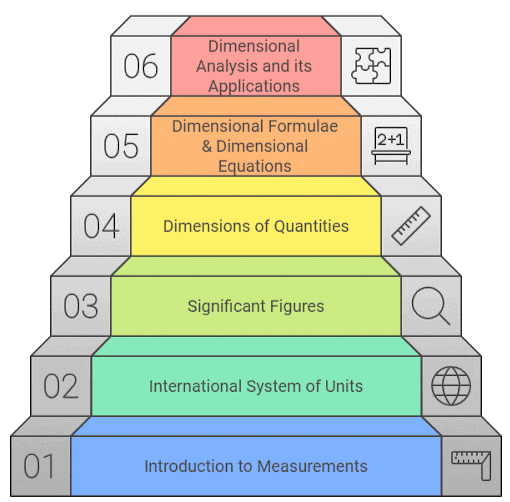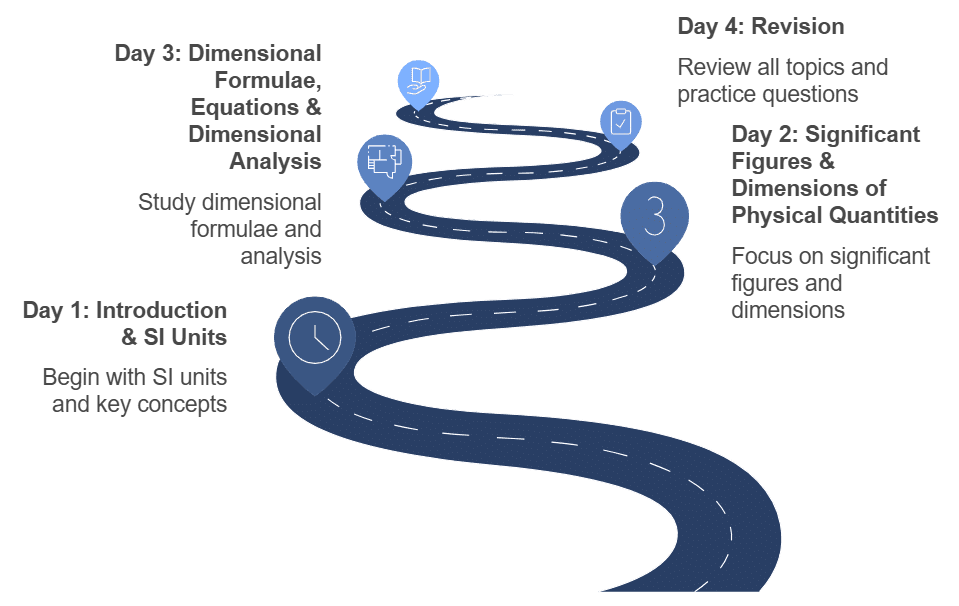5 Days Study Plan: Units and Measurements | Physics Class 11 - NEET PDF Download
Upon careful analysis of the Class 11 Physics chapter titled "Units & Measurements" with a focus on the past 8 years of NEET exam questions (spanning from 2016 to 2025), it is evident that this chapter holds a significant overall weightage in the NEET Exam. Understanding the concepts in this chapter is crucial for success in the exam.
Importance of the Chapter
This chapter introduces you to the fundamental concepts of measurement, which are essential in physics and many other sciences. It forms the foundation for various topics in physics and is frequently tested in competitive exams like NEET.
Topics Covered in the Chapter
Introduction: Begin your journey by understanding the significance of measurements in the physical world and how they are crucial in scientific research and everyday life. Refer to the NCERT Physics Class 11 textbook.
The International System of Units (SI): Explore the standardized system of units used globally, its seven base units, and their symbols. Familiarize yourself with the prefixes used for multiples and submultiples of these units.
Significant Figures: Learn about significant figures, their importance in measurement, and rules for determining the number of significant figures in a measurement. Utilize resources like DC Pandey Solutions for additional practice.
 Topics: Units & Measurements
Topics: Units & Measurements
- Dimensions of Physical Quantities: Understand the concept of physical dimensions and how to assign dimensions to various physical quantities. Gain insight into the dimensions of fundamental quantities like length, mass, and time.
- Dimensional Formulae and Dimensional Equations: Dive into dimensional analysis and explore how to derive dimensional formulae and equations for derived physical quantities. Learn to verify the dimensional correctness of equations. Check Dimensional Analysis & Formulas for formulas.
- Dimensional Analysis and Its Applications: Discover how dimensional analysis can be used to derive relationships between physical quantities, solve problems, and check the consistency of equations.
Day 1: Introduction & SI Units
- Read the respective sections from the NCERT Physics Class 11 textbook.
- Take notes on the key concepts and examples.
- Practice questions on the introduction and SI units.
- Explore the mind map to visualize the topic.
Day 2: Significant Figures & Dimensions of Physical Quantities
- Read the relevant sections in the NCERT textbook.
- Understand the rules for significant figures and practice problems.
- Learn how to assign dimensions to physical quantities.
- Attempt problems related to dimensions.
- Utilize the important formulas of the chapter for reference.
Day 3: Dimensional Formulae, Equations & Dimensional Analysis
- Study dimensional formulae and equations.
- Practice deriving dimensional equations for various physical quantities.
- Explore the applications of dimensional analysis.
- Solve problems using dimensional analysis techniques.
- Refer to EduRev for additional questions and solutions to further enhance your understanding.
Day 4: Revision
- Review all topics covered in the previous three days.
- Solve a mix of short and long questions from the NCERT textbook.
- Revisit the important formulas and concepts.
- Take advantage of the NEET Previous Year Questions document to practice NEET-level questions.
Revision Day
On the day of revision, follow these steps to consolidate your knowledge:
- Mind Map Review: Begin by revisiting the mind map for a quick overview of the entire chapter.
- Quick Notes Review: Go through your notes from each topic, focusing on key concepts and formulas.
- Practice Questions: Attempt a few challenging questions from each topic to test your understanding.
- Important Formulas: Recap the important formulas of the chapter for quick reference during the exam.
 Study Plan: Units & Measurements
Study Plan: Units & Measurements
By diligently following this study plan and utilizing resources available on EduRev, you can master the "Units & Measurements" chapter and excel in your Class 11 Physics studies as well as in the NEET Exam. Remember to practice regularly, and you'll build a strong foundation in this crucial subject. G
Here are all the important links and topic links for the "Units & Measurements" chapter:
Important Links:
Chapter Topics with Links:
- Introduction
- The International System of Units
- Significant Figures
- Dimensions of Physical Quantities
- Dimensional Formulae and Dimensional Equations
- Dimensional Analysis and Its Applications
Now, you have all the essential resources and topic links to help you study effectively for the "Units & Measurements" chapter in Class 11 Physics. Good luck!
|
96 videos|367 docs|98 tests
|
FAQs on 5 Days Study Plan: Units and Measurements - Physics Class 11 - NEET
| 1. What are SI units and why are they important in scientific measurements? |  |
| 2. How do significant figures affect calculations in science? |  |
| 3. What is dimensional analysis and how is it used in physics? |  |
| 4. What are dimensional formulae and how are they derived? |  |
| 5. How can I effectively revise the concepts of units and measurements before an exam? |  |






















